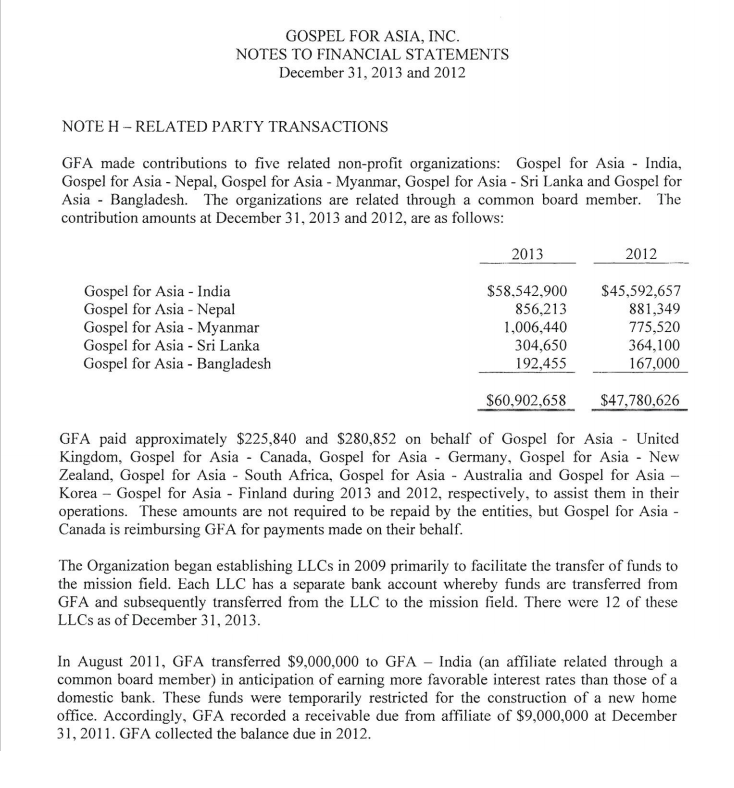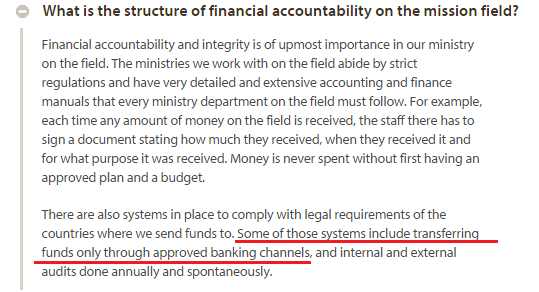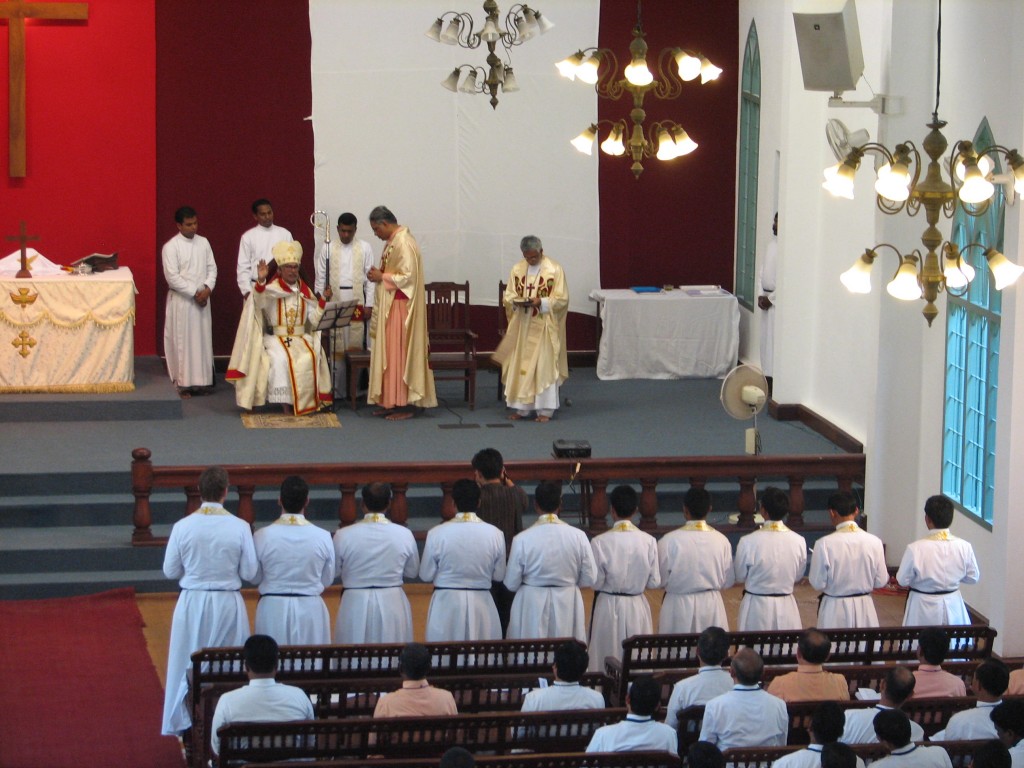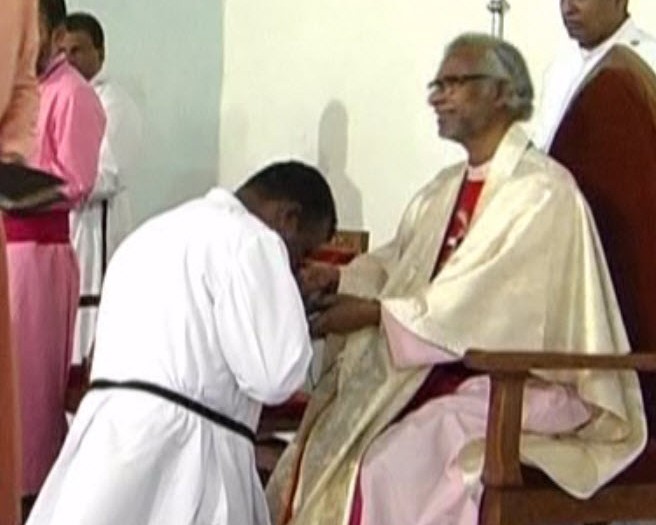In addition to the usual income and expenses data, Gospel for Asia’s audited financial statement discloses related party transactions. As you can see from the image below, the direction of the transaction is from the U.S. to GFA affiliates in Asian countries with 96% going to India. In addition to GFA India, GFA in the U.S. claims contributions to GFA affiliates in Myanmar, Sr Lanka, Bangladesh and Nepal. See below:
 GFA reports contributions to five related non-profits. However, in the Indian FC-6 report, three other charities — Believers’ Church, Love India Ministries, and Last Hour Ministries — report receiving contributions from GFA in America. In the audited financial statement above, GFA reports to Americans that the organization gave $58,542,900 to GFA India in calendar year 2013. However, in the FC-6 form filed to the Indian government, GFA – India reported that much less than $58 million was received. Just from the U.S., GFA – India reported that they received INR 404,638,271 which converts to $9,170,270 million USD during the period between April 1, 2013 and March 31, 2014 (see line 5 below).*
GFA reports contributions to five related non-profits. However, in the Indian FC-6 report, three other charities — Believers’ Church, Love India Ministries, and Last Hour Ministries — report receiving contributions from GFA in America. In the audited financial statement above, GFA reports to Americans that the organization gave $58,542,900 to GFA India in calendar year 2013. However, in the FC-6 form filed to the Indian government, GFA – India reported that much less than $58 million was received. Just from the U.S., GFA – India reported that they received INR 404,638,271 which converts to $9,170,270 million USD during the period between April 1, 2013 and March 31, 2014 (see line 5 below).*

GFA said in the audited financial statement over $58 million was sent to GFA India, but GFA in India reported only a little over $9 million being received (actually more like $6 million, see the last note below).**** So where is the rest of the money?
As I reported in a prior post, GFA in America also sent money to at least three other charities in India: Believers’ Church (INR 909,041,794 = $20,601,500), Love India Ministries (INR 162173900 = $3,675,330) and Last Hour Ministries (INR 161084820 = $3,650,650) (click the links for their FC-6 forms). Looking at what came from the United States to all four of these entities, the total is $37,097,750 which still does not get us to the $58 million GFA claims came from the U.S.** It is possible that GFA – U.S. contributes to other ministries in India that have not been disclosed or discovered yet. However, just taking these reports at face value (what GFA says in the audited statement and what GFA tells the Indian government, there appears to be a significant discrepancy.
It is worth asking what Love India Ministries and Last Hour Ministries do. I can’t find a viable web presence for either entity and as far as I can determine, GFA does not mention them in their materials. They may be shell companies operating in name only, much like the 12 limited liability corporations in Texas mentioned in the audited financial statement which exist just to transfer money to the field.***
Thus, at least two problems emerge for GFA’s credibility. One, GFA claimed in the audited financial statement that it only contributed to “five related non-profit organizations.” However, GFA in the U.S. uses 12 LLCs to send money to at least three additional registered charities in India (Believers’ Church, Love India Ministries and Last Hour Ministries) which are not disclosed in the audited financial statement. Two, the amounts GFA says they send to GFA in India comes nowhere close to matching what GFA – India reports to the Indian government.
Thus far, GFA has remained silent in the face of questions regarding cash smurfing to India, video of Believers’ Church bishops bowing and kissing the ring of GFA president K.P. Yohannan in contradiction to Yohannan’s denials of the ritual, discrepancies in Bridge of Hope giving requests and spending, and cash hoarding in Indian bank accounts. These discrepancies being reported today now call into question the accuracy of the American audited financial statement. Silence may be a good PR strategy but it seems ill-suited for a Christian ministry.
*It seems very unlikely that the different reporting years explains the $ million difference. Both methods of accounting cover 12 month periods which report consistent monthly giving totals year over year.
**Contributions to GFA-India, Believers’ Church, Love India Ministries and Last Hour Ministries from all foreign sources (including interest on foreign contributions) totaled $54, 550,683 for fiscal year ending March 31, 2014, still less than the $58 million to India reported on the audited financial statement.
***As an aside, it is worth asking again why sending cash to India in student backpacks was ever done. GFA told students it is a way to get cash into India. As one can see from the financial statement, GFA set up 12 LLCs to transfer money, and even transferred $9 million at one point just to get better interest payments. There appears to be no problem getting money back and forth from India.
****I remembered after doing the post that India’s FC-6 forms require a charity to record when the contributions are received. Thus, I was able to discern the amount sent during the calendar year 2013 but looking at the reports for the fiscal years 2012-2013 and 2013-2014. The situation is actually worse than I first reported. GFA – India reported that they received only $6 million in calendar year 2013. The American audit says GFA U.S. sent $58 million to GFA India in the calendar year but GFA India only reported $6 million in the same time span.
Tag: K.P. Yohannan
According to U.S. Customs and Border Protection, Smurfing – Dividing Cash Transfers Over $10k to Avoid Detection – Violates U.S. Law
 On May 14, I wrote that several Gospel for Asia staff and students had reported to me that they were asked to carry envelopes of cash to India without declaring that cash to U.S. customs. I then reported audio of Gospel of Asia leaders telling staff and School of Discipleship students in a May 14 staff meeting that GFA leaders planned to discontinue the practice of having groups of students take large sums of cash to India in their pack backs or suitcases on group trips. In that staff meeting, a student raised the issue with a question about why GFA leaders required each student on a mission trip to carry an envelope of $4500 cash to India. Amounts ranging from $45,000 to $135,00o (possibly more, I have not interviewed individuals from groups larger than 30) have allegedly been taken to India in this manner. GFA gave no specific reason for asking students to do this, but said their Texas auditor Bland Garvey approved the plan.
On May 14, I wrote that several Gospel for Asia staff and students had reported to me that they were asked to carry envelopes of cash to India without declaring that cash to U.S. customs. I then reported audio of Gospel of Asia leaders telling staff and School of Discipleship students in a May 14 staff meeting that GFA leaders planned to discontinue the practice of having groups of students take large sums of cash to India in their pack backs or suitcases on group trips. In that staff meeting, a student raised the issue with a question about why GFA leaders required each student on a mission trip to carry an envelope of $4500 cash to India. Amounts ranging from $45,000 to $135,00o (possibly more, I have not interviewed individuals from groups larger than 30) have allegedly been taken to India in this manner. GFA gave no specific reason for asking students to do this, but said their Texas auditor Bland Garvey approved the plan.
However, any cash transfer over $10,000 must be declared via a customs form when leaving the U.S. None of my sources filed any forms on their trips. In addition, GFA on the organization website denies using such means to carry funds to the field, saying (see the underlined sentence):

Obviously and by their own admission, GFA leaders did not follow this guideline.
Wanting to understand more about the law relating to cash transfers out of the country, I contacted by phone and email the media relations department of the Customs and Border Protection agency within the Department of Homeland Security. To the CBP media office, I posed the exact scenario just as the GFA students explained it to me. In response, a CBP spokesperson wrote in an email to describe the relevant U.S. law:
If an individual transports, attempts to transport, or causes to be transported (including by mail or other means) currency or other monetary instruments in an aggregate amount exceeding $10,000 (or its foreign equivalent) at one time from the United States to any foreign place, or into the United States from any foreign place, they must file a report with U.S. Customs and Border Protection (CBP).
This requirement is cited in 31 USC 5316; 31 C.F.R. 103.23 and the Bank Secrecy Act (BSA) of 1970, which identifies the source, volume, and movement of currency and monetary instruments being transported into or out of the United States or being deposited in financial institutions. The BSA aids law enforcement officials in the detection and investigation of criminal, tax, and regulatory violations.
CBP widely publicizes the currency reporting requirements on its website and through other means in order for travelers to be aware of the requirement to file a FinCen Form 105, Report of International Transportation of Currency or Monetary Instruments (CMIR). If unreported currency or monetary instruments are discovered on a person or in his carry-on luggage while boarding a departing aircraft this would constitute a CMIR violation.
Dividing currency amongst travelers requires the filing of a CMIR for the entire amount as intentionally aggregating currency exceeding $10,000 to evade reporting is against the law.
As a result of international drug trafficking, the United States and much of the world strengthened currency reporting requirements by enacting laws to counter money laundering schemes such as “Smurfing”. Smurfing is a form of structuring, or dividing large amounts of currency or monetary instruments between individuals within an organization, with each person or package carrying an amount under $10,000 to circumvent reporting requirements. Structuring, including “smurfing”, is a violation of 31 USC 5324. (emphasis added)
I then asked the public affairs office at Immigration and Customs Enforcement how their office handles such crimes. A spokesperson told me that no information could be given about current investigations, but persons who wish to pass along information can use the ICE tip line: http://www.ice.gov/tipline.
I also request that former/current staff, students or others who carried cash for GFA contact me via email (click the link).
How Much Does it Really Cost to Sponsor a Child with Gospel for Asia?
Yesterday, I pointed out that the expenditure of foreign funds by GFA in the fiscal year ending on March 31, 2014 for the support of children enrolled in the Bridge of Hope program seemed quite low, estimated at around $105 per year. Today, I want to point out that GFA’s request for child sponsorship in India is about one-third of what it is here in the U.S. and that the actual costs are even lower than that.
On the U.S. website, GFA requests $35/month to sponsor a child:
It only takes $35 a month to give a child everything they need—school supplies, a daily meal, medical checkups and more—to attend a Bridge of Hope Center. 100% of your sponsorship is sent to the field to support your child.
However, on the GFA/Believers’ Church Indian website, the cost is INR 800/month or about $12.50 in U.S. dollars per month. That’s quite a discount. The sponsorship page promises:
Your sponsorship of Rs. 800 per month provides [child’s name]:
- An Education
- A nutritious meal each day
- A yearly medical checkup
- Basic school & hygiene needs
I have also seen GFA budget documents which tell a more surprising story.* The actual cost during fiscal year ending 2014 to support one child in a GFA Bridge of Hope center in India was just under INR 500 or around $8.20 per month per child. This paid for the administration of the program, food purchases, and all child services. In fact, the actual items given to each child (school supplies, clothes, hygiene supplies and gifts) only cost INR 140 per child or $2.20 per month.
At that rate, Americans who send $35/month to GFA for a child sponsorship could actually support 4 children. Or GFA could keep the excess in a bank and draw interest on the balance as they appear to be doing. As I noted yesterday, GFA spent over $6 million in foreign contributions on Bridge of Hope expenses in FYE 2014 but had in the neighborhood of $25 million designated for “the welfare of children” sitting in a bank drawing interest at the same time.
GFA has to report that interest (the banks do as well) and all four GFA controlled organizations accumulated $4.2 million on the money in savings accounts by the end of FY 2014.
GFA says “100% of your sponsorship is sent to the field to support your child.” Perhaps this statement should be reworded. The money is sent to the field but a lot of it apparently ends up in a bank on the field.
It is past time for GFA to end the silence and address this matter as well as others which have come out in recent weeks.
*I have the documents but don’t have permission to publish them.
Gospel for Asia's K.P. Yohannan and the Ring Kissing Ritual
In one of my early communications with Gospel for Asia’s COO David Carroll I asked:
Can you confirm that the reason GFA organizes as an episcopal type church is related to Indian law. I have been told that Indian law requires GFA to register as a church and assume a governance structure similar to the officially recognized Catholic Church and the United Church of India. That means an episcopal structure (with bishops, etc.) is required. Thus KP Yohannan is officially the Metropolitan (archbishop) of the Believers Church. Is this why allegiance to KP Yohannan and kissing his ring is involved?
Carroll answered:
In regard to Gospel for Asia’s structure, while we are thoroughly evangelical, our organization and church structure is specific and unique to the areas where we work most heavily. Additionally, K.P. Yohannan’s title is understood in the countries where we work to refer to the senior leader of the organization. In regard to your question about kissing K.P.’s ring, I haven’t seen it, nor am I aware, that it has ever happened.
On ring kissing, David Carroll needs to see this video:
[youtube]https://youtu.be/rfHoh6xMEkM[/youtube]
The man seated is K.P. Yohannan and the men coming forward are being ordained into the Believers’ Church. They very clearly are kissing Yohannan’s hand, and at times, it seems clear that they are kissing his ring.
The allegations that GFA and Believers’ Church have evolved from an evangelical ministry to a self-contained episcopal type denomination have dogged GFA for about a decade. This video was taken at an ordination service. According to my source, the service took place in 2009 in India at one of the Believers’ Church seminaries.
One former leader in India told me that the pastors were taught several years ago to kiss Yohannan’s ring, which has the Believers’ Church emblem on it. However, many felt awkward with practice and the leaders revised the ritual to include bowing low before Yohannan before he touched a person’s forehead with his signet ring. In any case, these rituals seem to place significant emphasis on allegiance to the Metropolitan.
As recently as April of this year, Yohannan denied remembering it. In a staff meeting, in response to a question about it, Yohannan said:
Did anybody ever kiss my hand or my ring? In memory I cannot ever recall I allowed it to happen or if they did it. Because we never teach it. We never promote it. That is not our doctrine, I am not a god, anything, but if people who talk about it and say this, they saw it, what can I do.
What have I done to you or to anyone here to promote me? When I took the ring on my hand, as God Almighty my witness, I was going to a death chamber. I never asked anyone to kiss my ring, I never allowed it to happen. We never teach it, we never promote it.
Is There a Controlling Leadership Culture at Gospel for Asia?
The day before yesterday, I published correspondence between Gospel for Asia leaders and a group of nearly 80 former Gospel for Asia staffers. The former staffers have accused Gospel for Asia leaders of five major problems. From GFA’s perspective, a board investigation turned up no wrongdoing according the GFA COO David Carroll. The five charges are:
1. GFA leadership practices and teaches a false view of spiritual authority.
2. GFA leadership prioritizes ministry over family, and teaches the same.
3. GFA leaders lie or intentionally deceive people in order to “protect” the ministry.
4. GFA practices unbiblical shunning.
5. GFA prohibits or discourages staff involvement in bible studies, small groups and local churches.
Today, I want to examine the first allegation. In their letter, GFA former employees (GFA Diaspora – GFAD) accuse GFA leaders of asserting inappropriate control over the personal lives of employees. For instance, the GFAD letter says (K.P. refers to K.P. Yohannan, the founder of the organization):
K.P. once said at a prayer meeting that it would be sin to say “I’ll pray about it” instead of “Yes sir,” were he to request you move to Burma.
The letter also claims that GFA leaders believe they will be held accountable if their directives lead to negative outcomes.
They teach that God will not hold a staff member accountable if they sin in following GFA leadership. They teach that only GFA leadership would be accountable in the event that leadership steered them wrong. This is a false teaching, very similar to the the Shepherding Movement of the 1970s. GFA leaders have also told some staff who wanted to leave that they didn’t approve them leaving, as though they would be in sin by rebelling against the God-appointed leaders of their entire lives if they leave.
Another problem, say the GFAD, is the authority claimed by K.P. Yohannan while in India.
On the field, K.P. functions as an episcopal bishop, with the title, “His Eminence (or H.E.) Most Reverend Dr. K.P. Yohannan, Metropolitan Bishop,” and wears the robe, hat, ring and some other accompanying items. Staff and leaders there commonly kneel or bow and kiss K.P.’s ring in a sign of veneration (some of us are witnesses to this and one former field leader says “everyone” does it.)
As evidence, the GFAD show this picture of K.P. Yohannan in robes with a bishop’s staff.

I asked GFA COO David Carroll about this picture and he told me that “the picture you have was taken at an ordination service a few years ago, where it is a custom to dress in formal attire. This was a rare ceremonial occasion in India, and the special clothing was worn to honor local customs (much like is done here in the West for a graduation service).” Carroll told me that he has never seen anyone kissing Yohannan’s ring and was unaware of anyone doing it.
Regarding church structure in India, Carroll said the organization is “thoroughly evangelical.” He added that “our organization and church structure is specific and unique to the areas where we work most heavily. Additionally, K.P. Yohannan’s title is understood in the countries where we work to refer to the senior leader of the organization.” GFA’s website also addresses the reasons for a more episcopal form of governance as being helpful in the countries where they register as a church.
Regarding the charges of personal control, the GFA responses have denied the allegations. In a July email from GFA to GFAD, the spokesperson for GFA (identified as “David”) said:
This accusation is unfounded and false. Furthermore, the specific testimonies of these accusations by some of the signers of this letter differ greatly and/or lack key documented facts about the actual circumstances surrounding their testimony. Although we tried to contact every single one of you to discuss particulars and come to reconciliation, you refused to contact us back and give us that opportunity. With a clear conscience before God, we believe that GFA leadership regularly encourages staff (at morning and evening prayer meetings, new staff mentoring teachings, required readings, Sunday Bible studies, etc, etc) to have a vibrant daily walk with Christ, with the foundation of that being a few hours of daily Bible study, private prayer, and corporate prayer. The emphasis is always, if the tree is good, the fruit will be good also. In addition, GFA leadership will take the time to listen and to help staff with life issues when they are approached, but are careful not to control personal decisions, including where staff choose to worship, who they marry, where they live, etc. That said, Gospel for Asia is not a vocation or a job; it is a God-given calling. If someone chooses to serve at GFA (all of GFA not just Dallas), they also choose to follow the requests of leadership including where they will serve and what they will do, as long as they believe they are called by God to serve there. This is also true of secular companies (such as McDonald’s, IBM, Wal-Mart) or the Army, and anywhere that people are to do what is asked of them as a requirement of their job or service. We cannot call this sin, nor will we apologize for this commitment which is taught by our Lord Jesus, Himself, and is normal for many Christian as well as some secular organizations. Finally, in your original letter, you included a photo of Brother K. P. in his formal dress as the Metropolitan of the church during an ordination service. Since Believers Church operates under government approved church status as a constitutional episcopacy, it is required that he wear this uniform during the ceremony of ordination of pastors. This is done only for a few minutes; much like it is done during college graduation ceremony here in the west. We are NOT Catholic, nor are we Episcopalians, nor Anglicans, etc., etc. Rather, we are a Spirit-filled, evangelical church, born out of obedience to Christ’s Great Commission command to make disciples in all the world.
In a more formal response to GFAD, GFA again denied the substance of this claim. In the most recent statement from GFA, COO David Carroll said:
At the same time, our leadership team examined our HR policies and procedures, making improvements wherever possible, and affirmed the freedoms afforded to those called to the work of Gospel for Asia. While the board investigation concluded that there was no wrongdoing on the part of leadership, we recognize that, as humans, our leadership is not always going to be perfect.
This newest statement seems to recognize that some of the allegations may have some substance but did not admit to pervasive problems. A red flag for me in the GFA reply to the first letter is the following:
That said, Gospel for Asia is not a vocation or a job; it is a God-given calling. If someone chooses to serve at GFA (all of GFA not just Dallas), they also choose to follow the requests of leadership including where they will serve and what they will do, as long as they believe they are called by God to serve there. This is also true of secular companies (such as McDonald’s, IBM, Wal-Mart) or the Army, and anywhere that people are to do what is asked of them as a requirement of their job or service. We cannot call this sin, nor will we apologize for this commitment which is taught by our Lord Jesus, Himself, and is normal for many Christian as well as some secular organizations.
Comparing GFA to a secular job is what “David” said one cannot do (“…Gospel for Asia is not a vocation or a job…”). If an IBM employee refuses to re-locate, then that job might be in some jeopardy but the employee’s standing with God would not be. If GFA makes disagreement over personal calling a matter of disobedience to God, then there is a problem with that practice. If GFA claims to speak God’s will for individual employees, then the potential for abuse is obvious.
In GFAD’s follow up letter in September 2014, the concerns over leadership and authority continued:
However, each of us saw troubling signs. Authority was being abused, ministry was prioritized at the expense of family, the ministry’s image was protected through dishonesty, and isolation from believers in the local church was encouraged except to raise funds. Seeing these behaviors come from our respected leaders left us puzzled, as you might imagine.
One of the prevalent GFA teachings is that we should never share concerns with anyone but leadership. We were strongly discouraged from discussing issues with one another or with anyone outside GFA, which included our families and home churches, because we were warned that these people don’t understand our high calling and might pull us away. As a result, most of us did not share our concerns with anyone outside leadership until now.
At GFA, the teaching on submission to authority is strong. They say the Bible alone is authoritative, but in practice, it is the Bible as interpreted by Brother KP or other leaders. Because of this, searching the Scriptures like the Bereans did is not commended but is discouraged. To question or disagree with something on which GFA leadership has clearly spoken is generally labeled as murmuring, grumbling or rebellion. When we did voice our concerns to a leader, sometimes he listened and explained. But commonly he responded with anger because our honest questions were viewed as rebellion—and some of us were fired on the spot! If not fired, we faced ongoing suspicion and distrust from leadership that led to isolation and ostracism from staff families. Whether we resigned or were terminated, most of us did not receive an exit interview. A hint of fear remains whenever we question GFA because we have been taught that to question leadership is like the rebellion of Korah. This may be a reason our first letter was not well received.
According to GFAD, some GFA employees have reached out to make apology to individual members of the GFAD group. However, GFAD is looking for a more systemic response to their concerns. According to Carroll, the GFA board has taken their concerns seriously and made corrections where necessary. However, very little of what either side claims can be independently verified.
I have read quite a few testimonies from former workers which are not yet available publicly. These narratives do present a pattern of intrusion and an expectation that small details of life be cleared with ministry leaders. However, while they sound compelling, I have not been able to verify them as yet. Perhaps as more people come forward publicly, the picture will get clearer.
For now, interested readers can use these documents as a starting point for their research into GFA as a tool to help best steward their resources. Stay tuned for more.
I intend to cover the other four allegations and explore a few other areas of interest.
